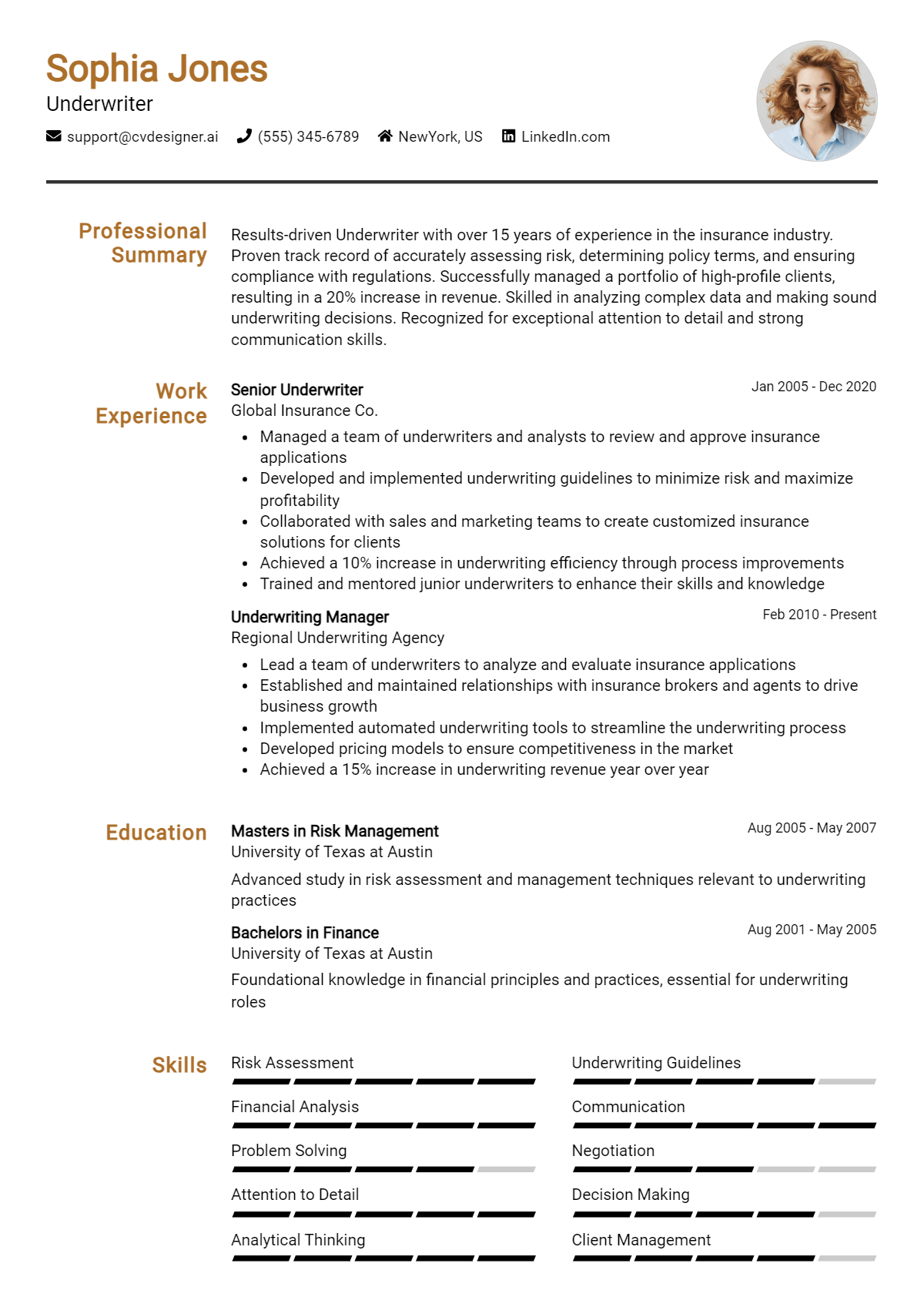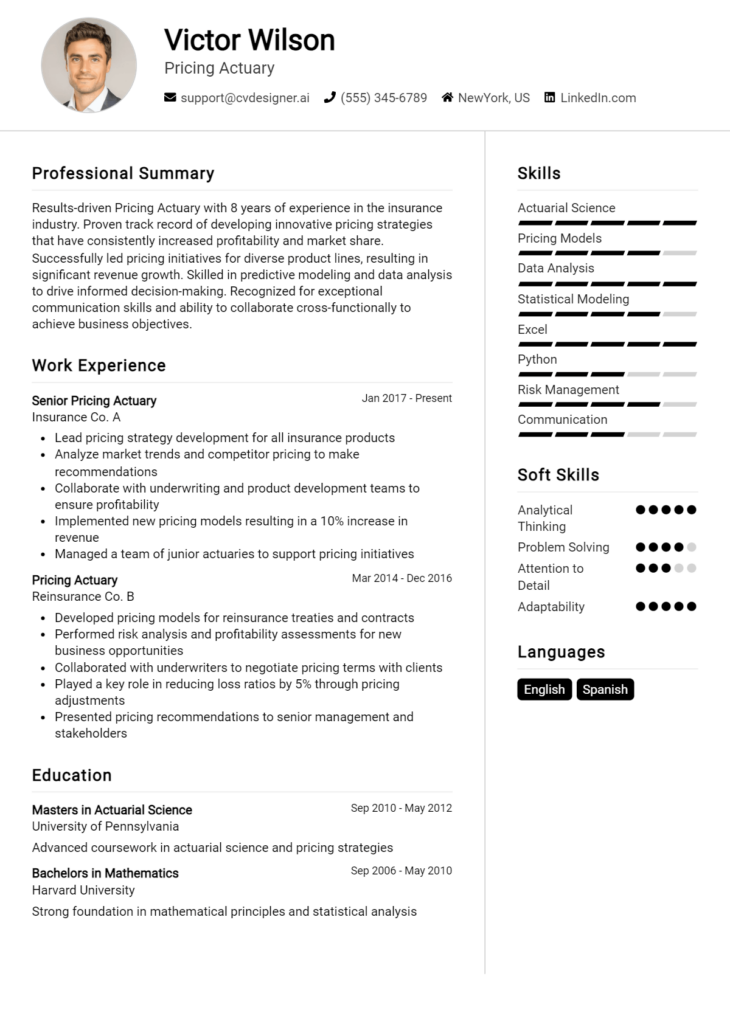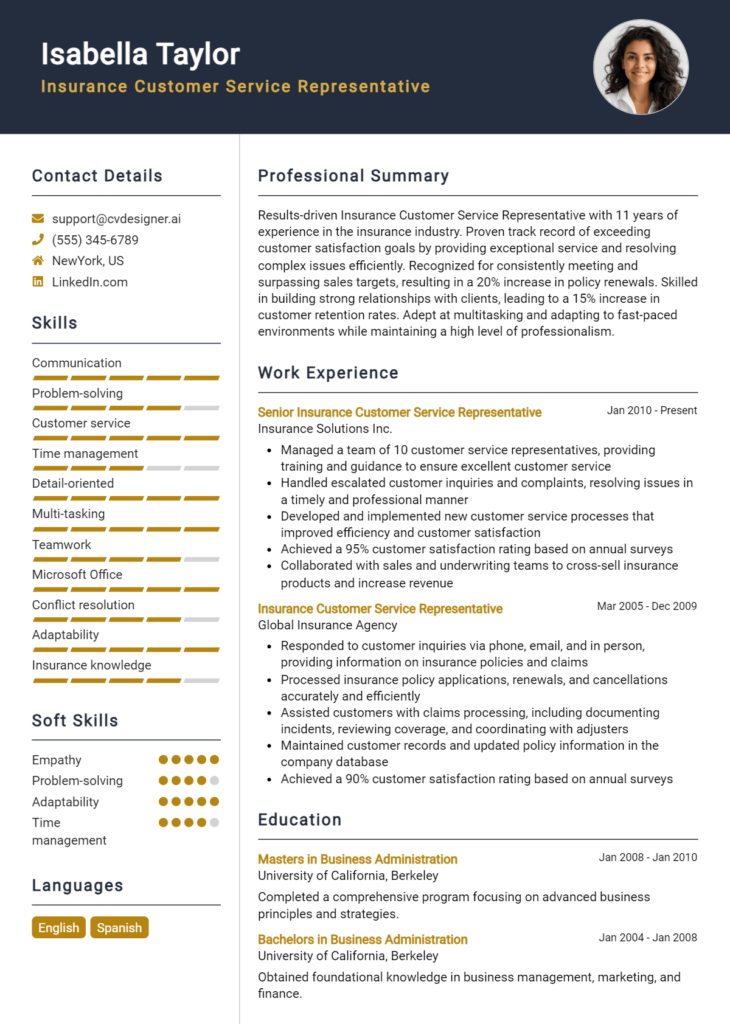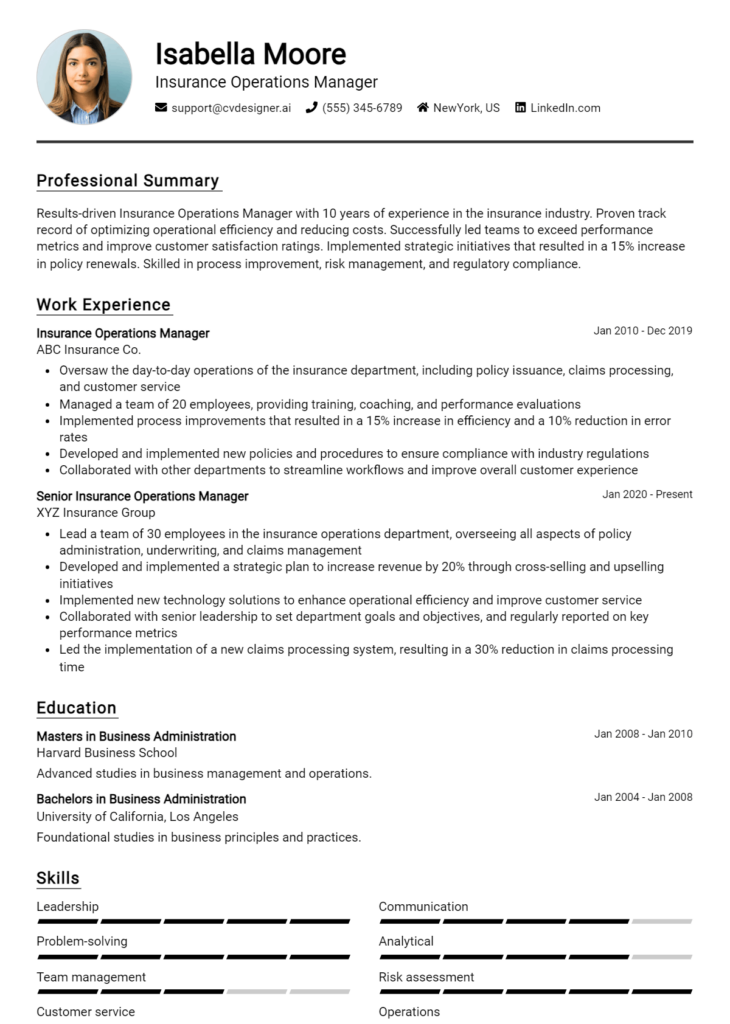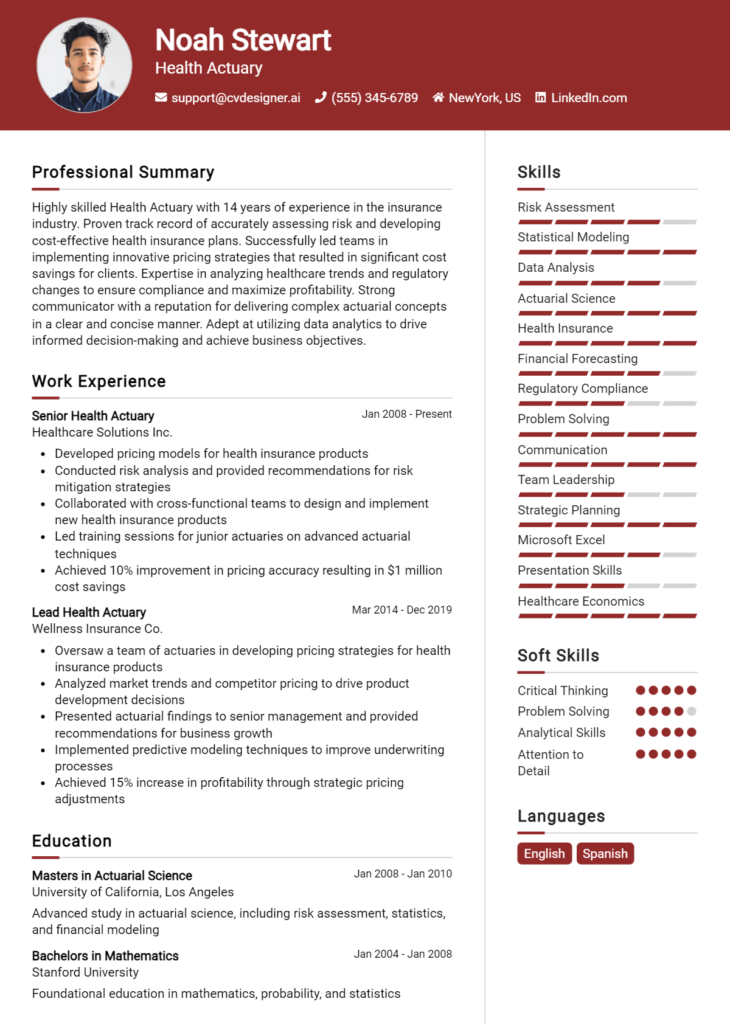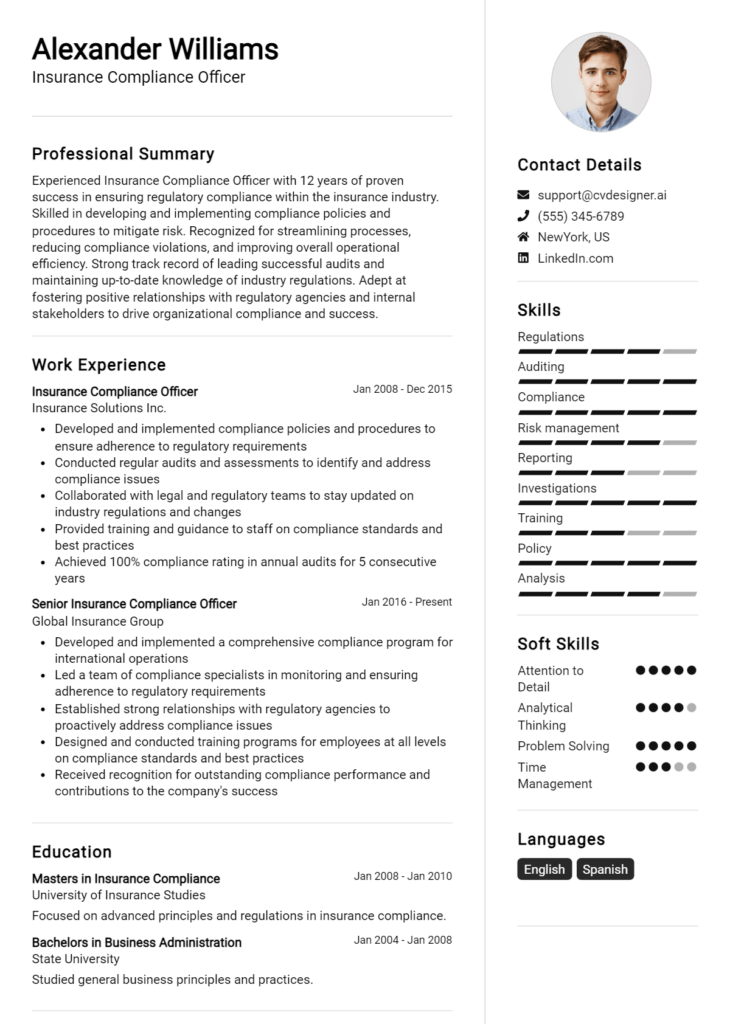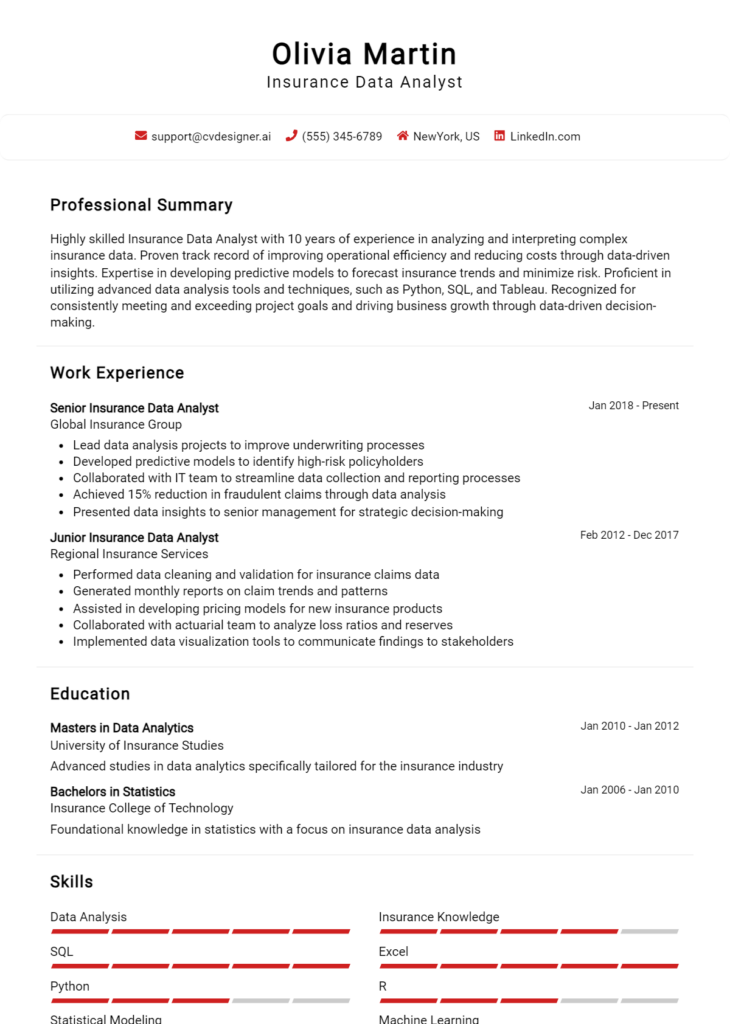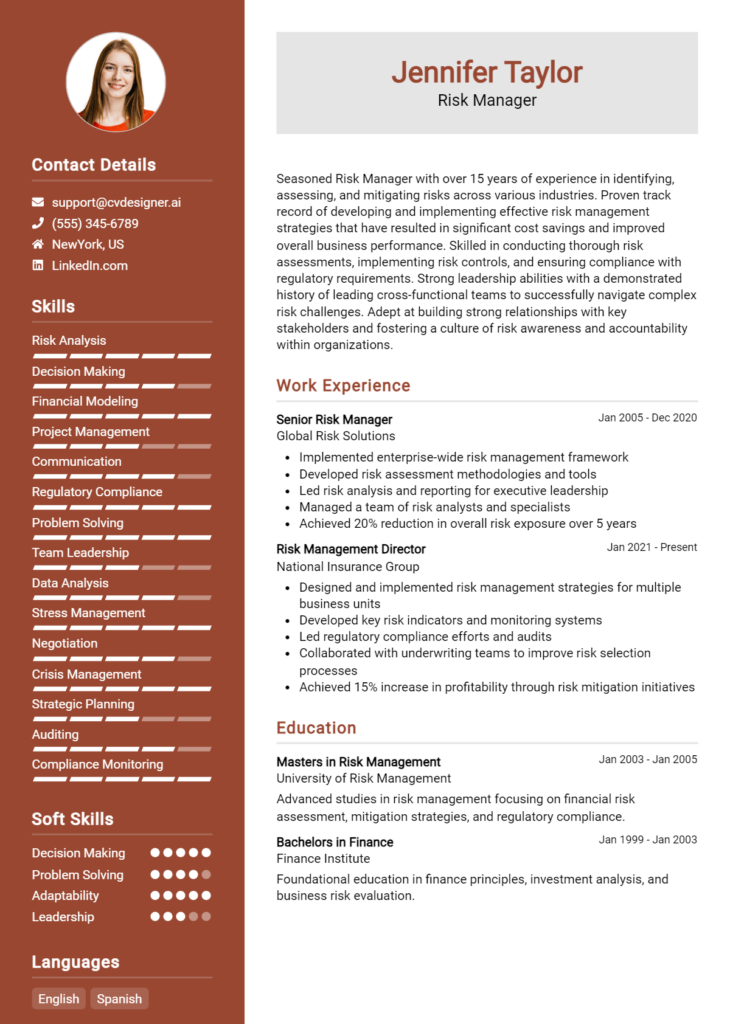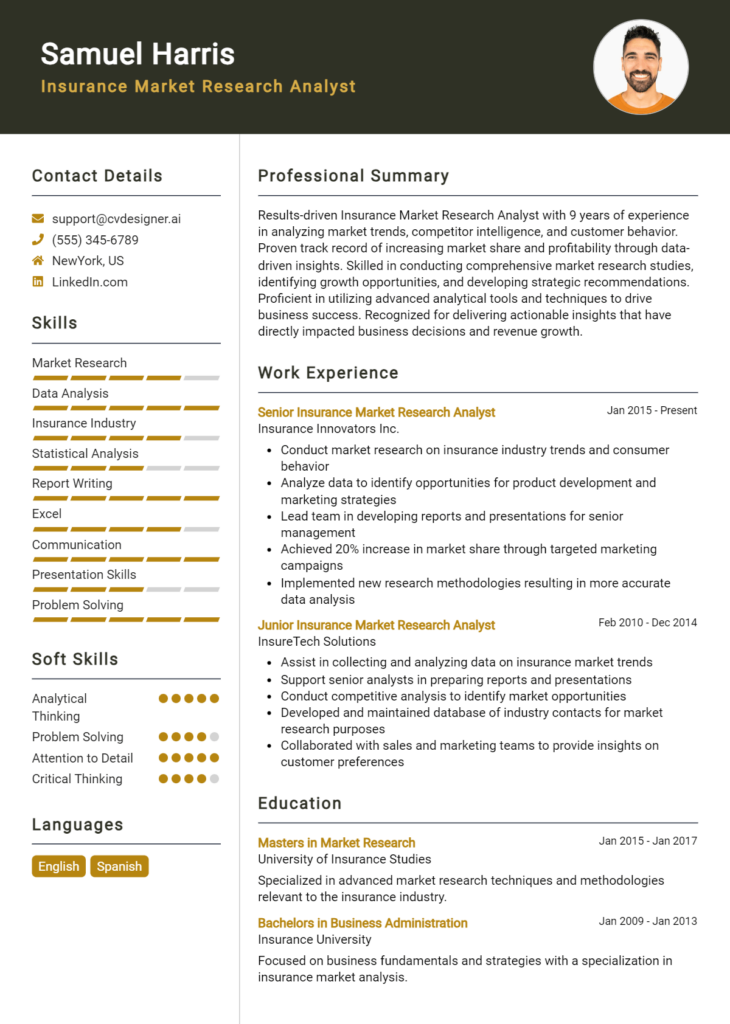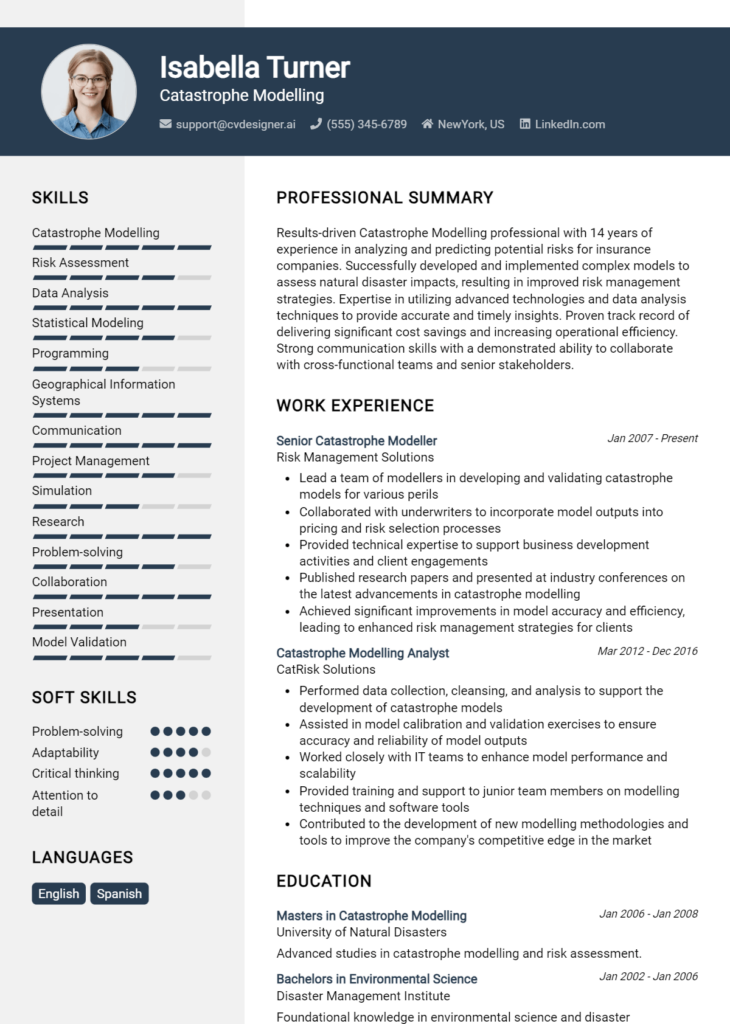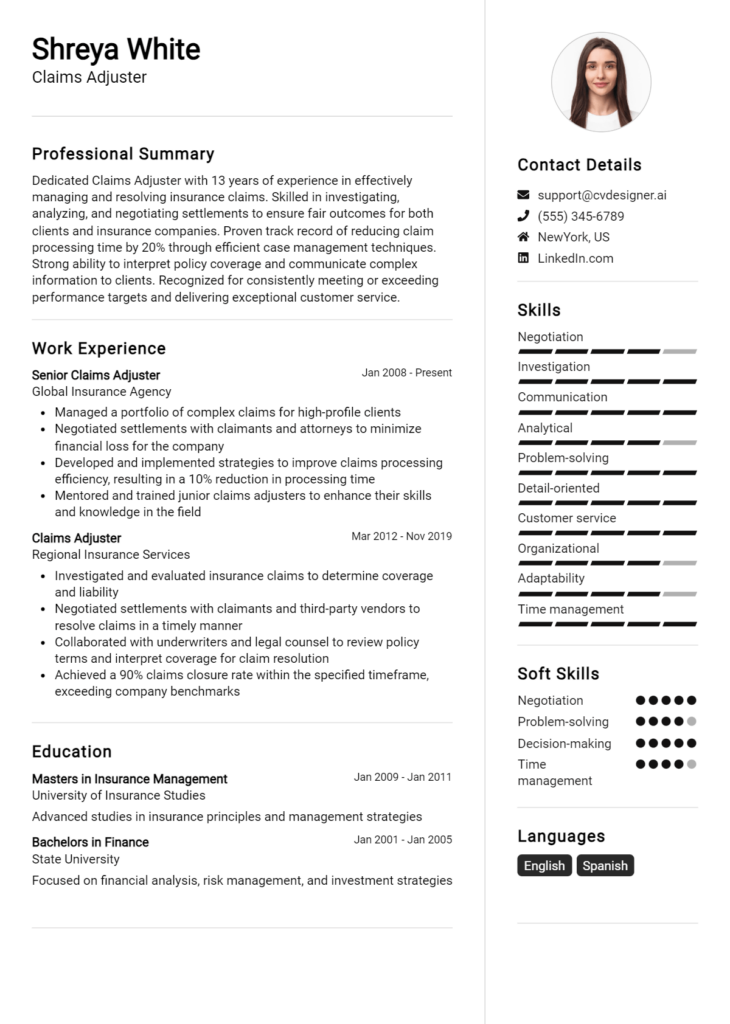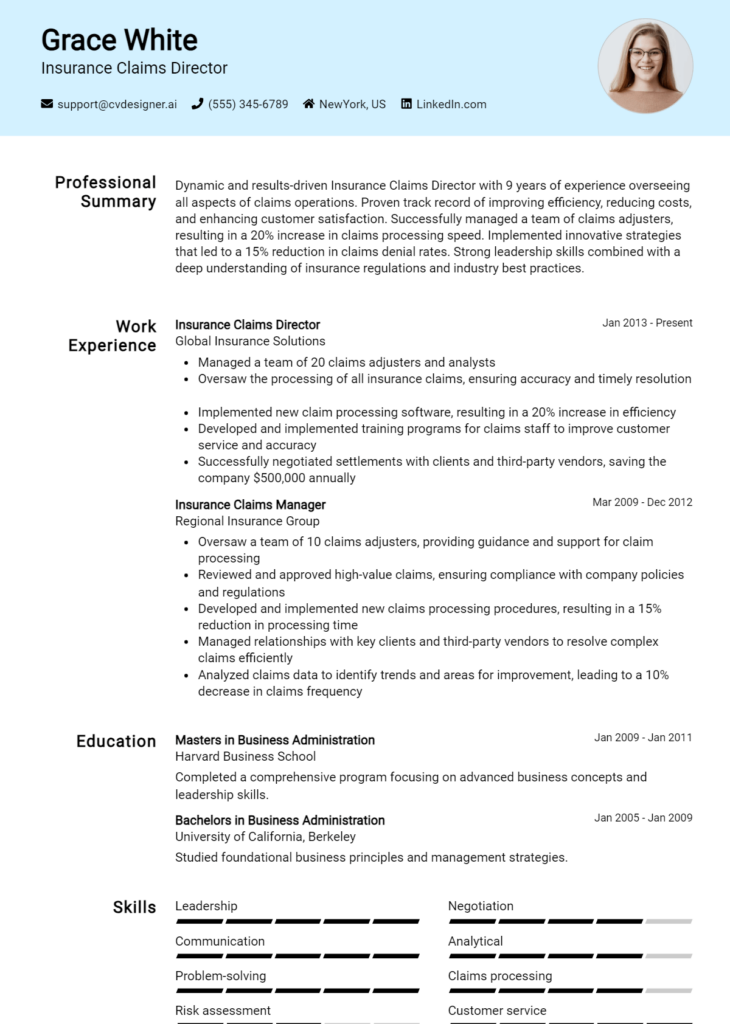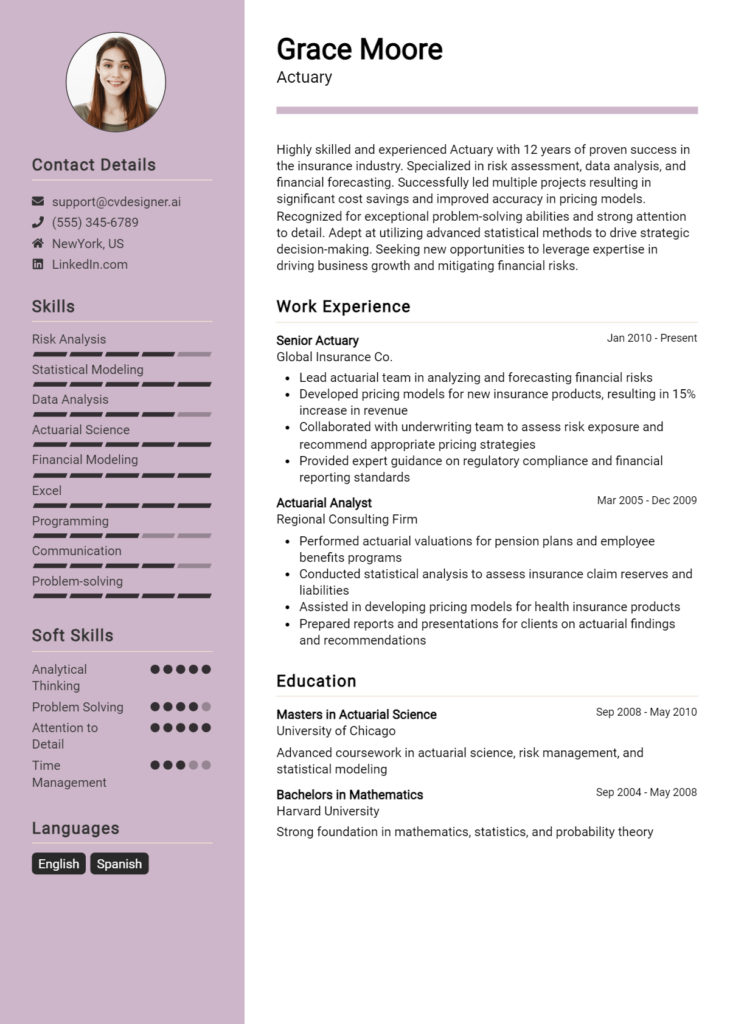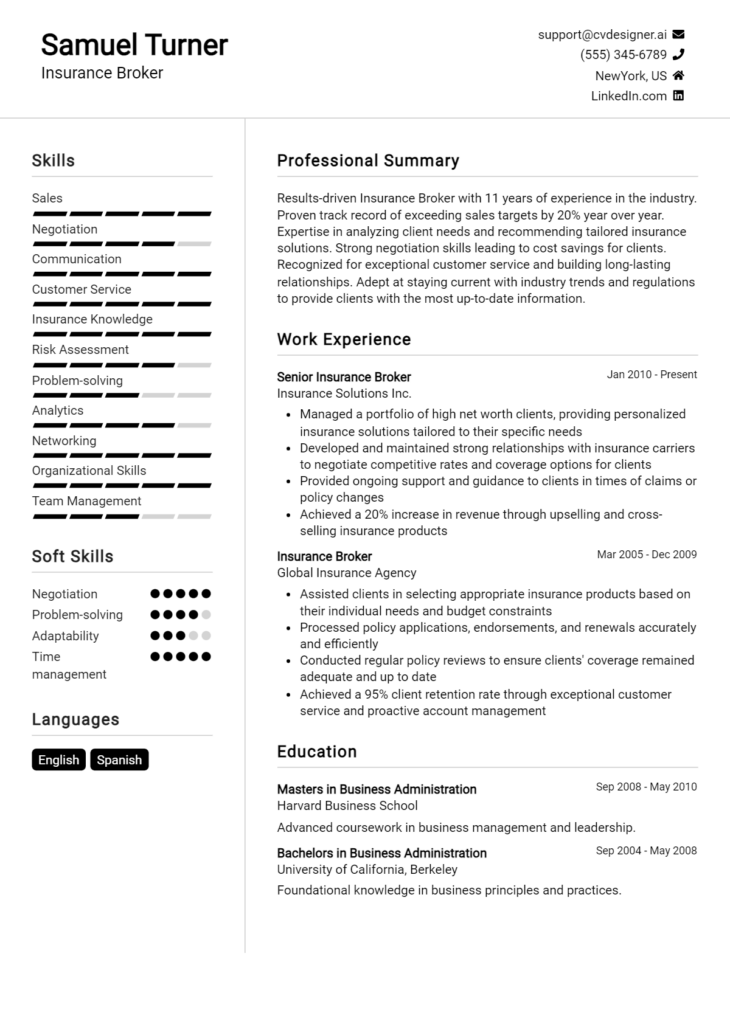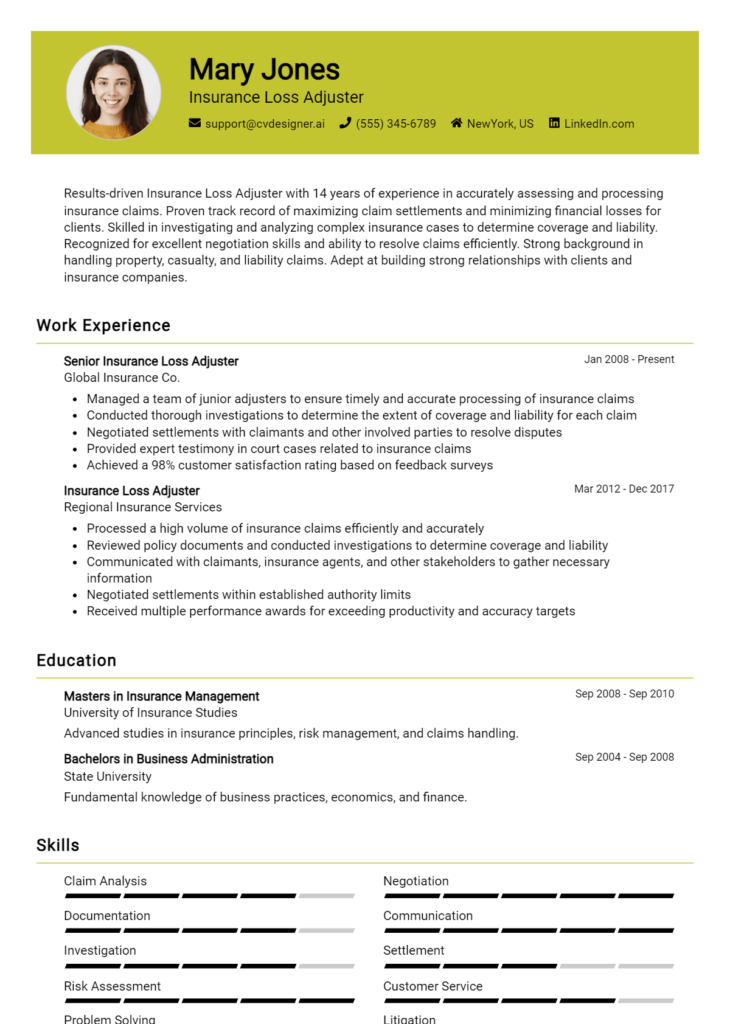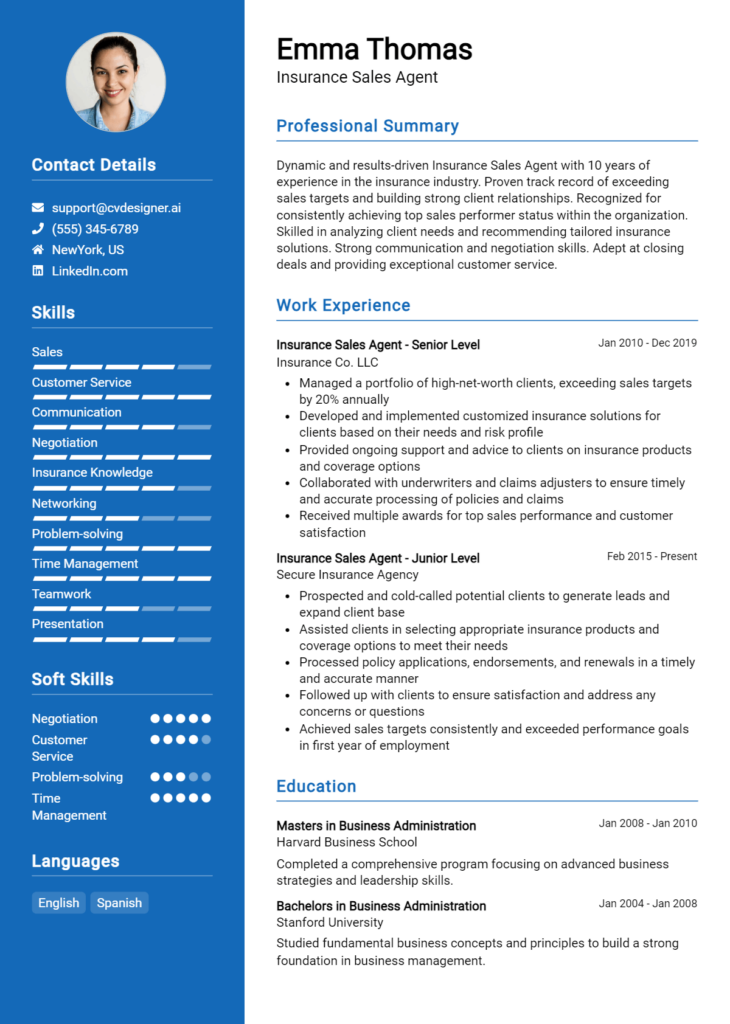Underwriter Core Responsibilities
An Underwriter plays a crucial role in assessing risks and determining coverage terms for policies, acting as a link between sales, risk management, and operations. Key responsibilities include evaluating applications, analyzing data, and making informed decisions based on financial assessments. Strong technical acumen, operational efficiency, and advanced problem-solving skills are essential for success in this role. These competencies not only help achieve organizational goals but also enhance the effectiveness of a well-structured resume that highlights these qualifications.
Common Responsibilities Listed on Underwriter Resume
- Evaluate insurance applications and related documents for completeness and accuracy.
- Analyze risk factors and determine appropriate coverage and premium rates.
- Collaborate with sales teams to understand client needs and tailor products accordingly.
- Review claims history and monitor industry trends to inform underwriting decisions.
- Communicate with agents and clients regarding underwriting decisions and requirements.
- Prepare detailed reports and documentation for internal review and compliance.
- Utilize underwriting software and tools to enhance decision-making efficiency.
- Conduct regular audits to ensure adherence to underwriting guidelines and policies.
- Provide training and support to junior underwriters and staff members.
- Participate in risk assessment meetings and contribute to strategic planning initiatives.
- Stay updated on regulatory changes and industry best practices affecting underwriting processes.
High-Level Resume Tips for Underwriter Professionals
In the competitive field of underwriting, a well-crafted resume serves as your first line of defense against a crowded job market. It’s not just a document; it’s your personal marketing tool that reflects your professional identity, skills, and achievements. A strong resume can make a lasting impression on potential employers, showcasing your ability to assess risk and make informed decisions. This guide will provide practical and actionable resume tips specifically tailored for Underwriter professionals, helping you to effectively communicate your value to prospective employers.
Top Resume Tips for Underwriter Professionals
- Tailor your resume to the specific job description, ensuring that you incorporate keywords and phrases from the posting.
- Highlight relevant experience in underwriting by detailing your responsibilities and the types of insurance you have worked with.
- Quantify your achievements by including metrics, such as the percentage of claims you successfully approved or the amount of risk you mitigated.
- Showcase industry-specific skills, such as familiarity with underwriting software, regulatory compliance, and risk assessment methodologies.
- Utilize a clean and professional format that enhances readability and allows your qualifications to stand out.
- Include certifications and professional designations relevant to underwriting, such as the Chartered Property Casualty Underwriter (CPCU) or Associate in Commercial Underwriting (ACU).
- Incorporate a summary statement at the top of your resume that succinctly outlines your experience and career goals.
- Emphasize soft skills, such as analytical thinking, attention to detail, and strong communication, which are vital for underwriting roles.
- Keep your resume concise, ideally one page, while ensuring that all critical information is included without fluff.
By implementing these tips, you can significantly enhance your resume, thereby increasing your chances of landing a job in the Underwriter field. A polished and targeted resume not only highlights your qualifications but also demonstrates your commitment and professionalism, making you a standout candidate in a competitive market.
Why Resume Headlines & Titles are Important for Underwriter
In the competitive field of underwriting, a well-crafted resume headline or title serves as a critical first impression for candidates. It acts as a succinct summary that captures the essence of an applicant's qualifications and expertise, allowing them to stand out in a crowded job market. A strong headline can immediately grab the attention of hiring managers, succinctly conveying the candidate's key strengths and relevance to the underwriting role. By being concise, relevant, and directly related to the position being applied for, a compelling headline can set the tone for the rest of the resume, making it more likely for the candidate to advance in the hiring process.
Best Practices for Crafting Resume Headlines for Underwriter
- Keep it concise: Aim for a headline that is no longer than one sentence.
- Be role-specific: Tailor your headline to reflect the specific position of underwriter.
- Highlight key skills: Incorporate essential skills relevant to underwriting, such as risk assessment or analytical abilities.
- Use action verbs: Start with impactful verbs to convey your proactive approach.
- Include certifications: If applicable, mention any relevant certifications like CPCU or AIC.
- Focus on accomplishments: Highlight any notable achievements in underwriting that set you apart.
- Utilize industry keywords: Use terminology that is commonly recognized in the underwriting field.
- Maintain professionalism: Ensure the tone is formal and suitable for the finance and insurance industry.
Example Resume Headlines for Underwriter
Strong Resume Headlines
Results-Driven Underwriter with 5 Years of Experience in Risk Assessment and Management
Detail-Oriented Underwriter Specializing in Commercial Lines and Client Relationship Management
Certified Professional Underwriter Committed to Delivering Accurate Risk Evaluations and Excellent Service
Weak Resume Headlines
Underwriter Seeking Job
Experienced Professional
The strong headlines are effective because they provide specific information about the candidate's experience, skills, and focus areas, immediately demonstrating their value and relevance to the underwriting role. In contrast, the weak headlines lack detail and fail to convey any unique qualifications or strengths, making them forgettable and ineffective in capturing the attention of hiring managers.
Writing an Exceptional Underwriter Resume Summary
A well-crafted resume summary is essential for an Underwriter as it serves as the first impression a candidate makes on hiring managers. A strong summary quickly captures attention by highlighting key skills, relevant experience, and notable accomplishments directly tied to the job role. It acts as a powerful elevator pitch that conveys the candidate's unique value proposition in a concise and impactful manner, ensuring that the summary is tailored to the specific job application. By effectively summarizing qualifications, the candidate increases their chances of standing out in a competitive job market.
Best Practices for Writing a Underwriter Resume Summary
- Quantify achievements: Use specific numbers and metrics to demonstrate the impact of your work.
- Focus on relevant skills: Highlight skills that are specifically mentioned in the job description.
- Tailor the summary: Customize your summary for each job application to align with the employer’s needs.
- Be concise: Keep your summary to 2-4 sentences to ensure it remains impactful.
- Use industry-specific language: Incorporate terminology that reflects your expertise in underwriting.
- Showcase accomplishments: Highlight significant contributions and results in previous roles.
- Avoid jargon: Make sure the language is clear and accessible to HR professionals who may not be underwriting experts.
- Maintain a professional tone: Keep the summary formal and focused on your professional qualifications.
Example Underwriter Resume Summaries
Strong Resume Summaries
Detail-oriented Underwriter with over 5 years of experience in assessing risk and developing underwriting guidelines. Successfully reduced claim losses by 20% through meticulous risk evaluation and innovative policy adjustments.
Results-driven Underwriter with a proven track record of managing a portfolio exceeding $10 million. Expert in utilizing advanced analytics to enhance underwriting processes, leading to a 30% increase in operational efficiency.
Dedicated Underwriter with a background in commercial and personal lines, adept at identifying key risk factors. Achieved a 95% accuracy rate in risk assessments, significantly improving client satisfaction and retention.
Weak Resume Summaries
Experienced Underwriter looking for a new opportunity. Skilled in various tasks and knowledgeable about the industry.
Underwriter with some experience in the field. I am a hardworking individual who is eager to learn and grow in my career.
The strong resume summaries are effective because they provide concrete examples of achievements, quantify results, and directly reference relevant skills that align with the underwriting role. In contrast, the weak summaries lack specificity and measurable outcomes, making them less compelling and memorable to potential employers. By avoiding vague descriptions and focusing on tangible results, candidates can significantly improve their chances of attracting attention in the hiring process.
Work Experience Section for Underwriter Resume
The work experience section of an Underwriter resume is vital as it offers potential employers a comprehensive view of the candidate's professional background, technical skills, and ability to deliver high-quality products. This section not only highlights relevant experiences but also showcases the candidate's proficiency in risk assessment and policy evaluation, along with their capability to manage teams effectively. By quantifying achievements and aligning experiences with industry standards, candidates can demonstrate their impact within their previous roles, making them more appealing to prospective employers.
Best Practices for Underwriter Work Experience
- Detail your technical skills related to underwriting software and risk assessment tools.
- Quantify your achievements with specific metrics, such as improved processing times or reduced losses.
- Highlight your ability to collaborate with cross-functional teams, including sales and claims departments.
- Emphasize your leadership experience, particularly in mentoring junior underwriters.
- Provide examples of how you have implemented industry best practices and compliance standards.
- Focus on results-driven statements that reflect your contributions to company goals.
- Tailor your work experience to align with the specific requirements of the job you are applying for.
- Use action verbs to convey a sense of initiative and impact in your roles.
Example Work Experiences for Underwriter
Strong Experiences
- Led a team of 5 underwriters to streamline the risk assessment process, resulting in a 20% decrease in turnaround time for policy approvals.
- Implemented a new underwriting software that increased accuracy in risk evaluation by 30%, contributing to a 15% reduction in underwriting losses.
- Collaborated with sales and marketing teams to develop tailored insurance products, achieving a 25% increase in client acquisition within six months.
- Mentored junior underwriters, improving team performance and increasing overall productivity by 18%.
Weak Experiences
- Responsible for underwriting various policies.
- Worked on a team to process applications.
- Helped improve underwriting practices.
- Reviewed documents for accuracy.
The examples categorized as strong demonstrate concrete achievements and specific contributions that reflect technical expertise and leadership in the underwriting field. They provide quantifiable results and detailed descriptions of collaborative efforts, which are essential for highlighting a candidate's value. In contrast, the weak experiences lack specificity and measurable outcomes, making them less impactful and failing to effectively showcase the candidate’s skills and contributions in a competitive job market.
Education and Certifications Section for Underwriter Resume
The education and certifications section of an Underwriter resume is crucial as it showcases the candidate's academic background, industry-relevant certifications, and commitment to continuous learning. This section provides hiring managers with insight into the candidate’s qualifications, ensuring that they possess the necessary knowledge and skills required for the role. By including relevant coursework, certifications, and any specialized training, candidates can significantly enhance their credibility and demonstrate alignment with the job requirements, making them a more attractive option for potential employers.
Best Practices for Underwriter Education and Certifications
- Focus on relevant degrees, such as Finance, Business Administration, or Risk Management.
- Highlight industry-recognized certifications, like Chartered Property Casualty Underwriter (CPCU) or Associate in Commercial Underwriting (ACU).
- Include specific coursework that pertains to underwriting practices, risk assessment, or financial analysis.
- Emphasize continuous learning by listing any recent seminars, workshops, or online courses.
- Use clear and concise language to describe each credential and its relevance to underwriting.
- Organize the section in reverse chronological order, starting with the most recent qualifications.
- Consider including GPA if it is commendable, particularly for recent graduates.
- Tailor the content to match the job description, emphasizing qualifications that align with the employer's needs.
Example Education and Certifications for Underwriter
Strong Examples
- Bachelor of Science in Finance, University of XYZ, Graduated May 2021
- Chartered Property Casualty Underwriter (CPCU), 2023
- Associate in Commercial Underwriting (ACU), 2022
- Advanced Risk Management Training, Risk Management Society, Completed 2023
Weak Examples
- Bachelor of Arts in History, University of ABC, Graduated May 2000
- Certified Personal Trainer, National Academy of Sports Medicine, 2021
- Online Course in Basic Cooking Skills, 2020
- High School Diploma, City High School, Graduated 1998
The strong examples are considered effective as they directly relate to the underwriting field, showcasing relevant degrees and certifications that enhance the candidate's qualifications. These credentials demonstrate a solid understanding of financial principles and risk management, which are essential for an Underwriter role. In contrast, the weak examples lack relevance to the underwriting profession, featuring outdated or unrelated educational qualifications and certifications that do not contribute to the candidate’s credibility in the eyes of potential employers.
Top Skills & Keywords for Underwriter Resume
As an underwriter, the ability to assess risk and make informed decisions is crucial to the success of any insurance or financial institution. The skills highlighted in an underwriter’s resume not only demonstrate their capacity to evaluate applications but also reflect their analytical thinking, attention to detail, and communication abilities. Employers often seek candidates who possess a well-rounded combination of hard and soft skills, ensuring they can navigate complex situations and collaborate effectively with clients and colleagues. A strong emphasis on relevant skills can significantly enhance an underwriter's application, making it essential to showcase both technical expertise and interpersonal capabilities to stand out in a competitive job market.
Top Hard & Soft Skills for Underwriter
Soft Skills
- Analytical Thinking
- Attention to Detail
- Communication Skills
- Problem-Solving
- Negotiation Skills
- Time Management
- Interpersonal Skills
- Decision-Making
- Critical Thinking
- Adaptability
Hard Skills
- Risk Assessment
- Data Analysis
- Financial Acumen
- Knowledge of Underwriting Software
- Regulatory Compliance
- Report Writing
- Statistical Analysis
- Market Research
- Familiarity with Insurance Policies
- Proficiency in Microsoft Excel
By emphasizing these skills, underwriters can effectively convey their qualifications and readiness for the role, while also demonstrating their past work experience in the field.
Stand Out with a Winning Underwriter Cover Letter
Dear [Hiring Manager's Name],
I am writing to express my interest in the Underwriter position at [Company Name] as advertised on [where you found the job listing]. With a solid background in risk assessment and a keen analytical mindset, I am excited about the opportunity to contribute to your team. My experience in evaluating insurance applications and my ability to make informed decisions based on data analysis align perfectly with the qualifications you seek.
In my previous role at [Previous Company Name], I successfully assessed a diverse range of applications, ensuring that underwriting decisions adhered to company policies and industry regulations. My proficiency in utilizing underwriting software and tools enabled me to streamline the review process, resulting in a 15% increase in efficiency over the past year. I take pride in my meticulous attention to detail and my commitment to providing exceptional service to both clients and colleagues, which has helped foster positive relationships and a collaborative work environment.
Furthermore, I am well-versed in market trends and risk factors that influence underwriting decisions, allowing me to make well-rounded assessments. I believe that continuous learning is crucial in this ever-evolving field, and I regularly attend workshops and industry seminars to stay updated on best practices and emerging technologies. I am eager to bring my expertise and passion for underwriting to [Company Name], where I can contribute to maintaining your high standards of quality and reliability.
Thank you for considering my application. I look forward to the opportunity to discuss how my skills and experiences can benefit [Company Name] and help drive your underwriting goals forward. Please feel free to contact me at [Your Phone Number] or [Your Email Address] to arrange a conversation.
Sincerely,
[Your Name]
Common Mistakes to Avoid in a Underwriter Resume
When crafting a resume for an underwriter position, it's crucial to present your skills and experiences clearly and effectively. However, many candidates inadvertently make mistakes that can hinder their chances of landing an interview. Understanding these common pitfalls can help you create a compelling resume that stands out to hiring managers. Here are some mistakes to avoid:
Overly Generic Objective Statement: Using a vague objective statement fails to capture the attention of employers. Instead, personalize it to reflect your career goals and how they align with the specific position.
Inadequate Quantification of Achievements: Simply listing job duties without quantifying your accomplishments can weaken your resume. Use specific numbers or percentages to highlight your contributions, such as "reduced risk assessment time by 30%."
Ignoring Relevant Industry Keywords: Many companies use Applicant Tracking Systems (ATS) to filter resumes. Failing to include relevant keywords from the job description can result in your resume not making it through the initial screening.
Including Irrelevant Experience: Tailor your resume to focus on experiences relevant to underwriting. Extraneous information can distract from your qualifications and dilute your message.
Poor Formatting and Structure: A cluttered or inconsistent format can make your resume hard to read. Ensure your document is well-organized, with clear headings, bullet points, and uniform font styles for better readability.
Neglecting to Highlight Soft Skills: While technical skills are crucial, underwriters also need strong analytical, decision-making, and communication skills. Be sure to emphasize these soft skills in your resume.
Failing to Proofread: Spelling and grammatical errors can give a negative impression of your attention to detail. Always proofread your resume or have someone else review it before submission.
Lack of Professional Summary: Omitting a professional summary can limit your ability to make a strong first impression. A well-crafted summary can succinctly showcase your expertise and career aspirations.
Conclusion
As an Underwriter, you play a crucial role in evaluating risks and determining appropriate coverage for clients. Throughout this article, we've discussed the essential skills and qualifications needed for the job, including analytical abilities, attention to detail, and strong communication skills. We also highlighted the importance of staying updated with industry trends and regulations to make informed decisions.
In conclusion, it’s vital to ensure that your Underwriter resume effectively showcases your expertise and experiences. Take a moment to review your resume, ensuring it reflects your qualifications and makes a strong impression on potential employers.
To assist you in this process, consider utilizing various resources available, such as resume templates to create a professional layout, the resume builder for a step-by-step guide to crafting your resume, resume examples for inspiration, and cover letter templates to accompany your application. Don’t miss the opportunity to stand out in your job search—take action today!

